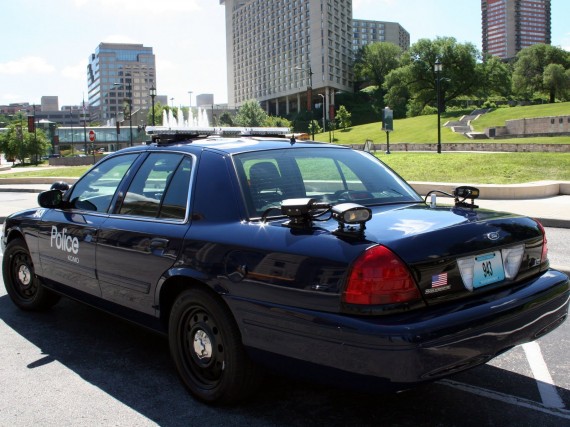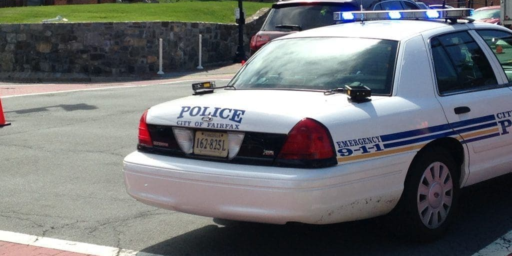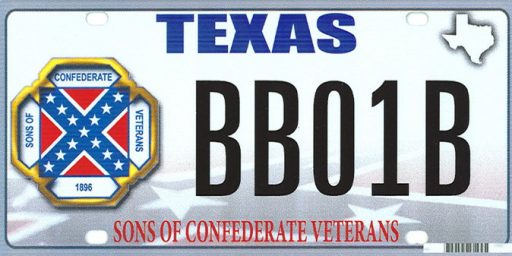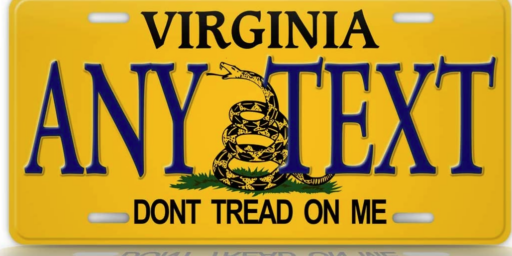ACLU: Police Can Read, Track, And Store Your License Plate Number Wherever You Go
New technology brings the day of round the clock tracking of citizens who've done nothing wrong ever closer.
A new report from the American Civil Liberties Union reveals the existence of technology that allows police to record the license plate of every car an officer encounters while on patrol, catalog it, and compare it to a database of suspect vehicles:
(CNN) – Police around the United States are recording the license plates of passing drivers and storing the information for years with little privacy protection, the American Civil Liberties Union said Wednesday.
The information potentially allows authorities to track the movements of everyone who drives a car.
The ACLU documented the police surveillance after reviewing 26,000 pages of material gathered through public records requests to almost 600 local and state police departments in 38 states and the District of Columbia.
Police are gathering the vehicle information with surveillance technology called automatic license plate readers, and it’s being stored — sometimes indefinitely — with few or no privacy protections, the ACLU said.
“The documents paint a startling picture of a technology deployed with too few rules that is becoming a tool for mass routine location tracking and surveillance,” the ACLU said in a written statement.
The license plate readers alert police to an automobile associated with an investigation, “but such instances account for a tiny fraction of license plate scans, and too many police departments are storing millions of records about innocent drivers,” the ACLU said.
“Private companies are also using license plate readers and sharing the information they collect with police with little or no oversight or privacy protections. A lack of regulation means that policies governing how long our location data is kept vary widely,” the ACLU said.
The civil liberties group is advocating legislation regulating the use of the technology.
Law enforcement, of course, considers the technology a valuable tool:
Law enforcement argues the tools keep officers and the public safe.
In a blog post last week, the Los Angeles Police Protective League said that license plate recognition (LPR) technology has helped with “literally thousands of cases nationwide.”
“LPR is not an invasion of privacy, but rather a tool for law enforcement to better accomplish its mission to protect and serve. The onus is on law enforcement agencies and governing bodies to ensure that they have proper policies in place for disciplined and responsible use, with appropriate punishments for anyone operating outside of policy,” the union said.
The ACLU report cited how the Minneapolis Star Tribune in 2012 tracked the movement of the Mayor R.T. Rybak’s car 41 times at a license police reader in the prior year. The newspaper put the information on a map and gathered the data through public records requests.
The newspaper found that the police department’s plate readers yielded hits of fewer than 1% of the 805,000 plate scans made in June 2012, according to the ACLU
As the ACLU asks, this raises serious questions about how these programs impact the other 99% of us:
Should the government be logging for months, years, or indefinitely the movements of the other 99 percent of people, who are innocent?
The answer to this question is no. License plate reader information can be very revealing. While one snapshot at one point might not seem sensitive, as blankets of plate readers cover our streets, and as the government stores data for longer and longer, the technology quickly morphs into a powerful tracking tool.
As computer technology and storage capacity get cheaper every year, we need to prepare for a future not just where there are a few license plate reader cameras in every town, but one in which there are multiple cameras on every block.
What can location data reveal about people? Trips to places of worship, political protests, or gun ranges can be paowerful indicators of people’s beliefs. Is it really the government’s business how often you go to the drug store or liquor store, what doctors you visit, and the identities of your friends? I’m sure all of us can remember something from our past that could embarrass us. If the government comes to suspect you of something in 2020, should it have access to databases stretching back years that could dig up facts about you that previously went unnoticed?
Off the top, it’s necessary to address some of the same legal and Constitutional issues that came up when we first learned about the National Security Agency’s metadata collection programs. For one thing, there does not appear to be on the surface any per se Constitutional objection to a police officer taking note of the license plates of the vehicles around him or her while out on patrol. Indeed, ever since there have been computers in patrol cars hooked into the relevant databases, it’s been common practice for officers to tap in license plate numbers while waiting in traffic or at stop lights. If a hit comes up — such as a car owned by someone who has a suspended license, or a car on the list of stolen cars — then the officer will typically either pull the car over since they now have reasonable suspicion to do so, or follow the car until further instructions are received. There’s no 4th Amendment violation here because you don’t have a reasonable expectation of privacy in your license plate number and, indeed, you most assuredly don’t if you’re sitting in a traffic jam with a police car directly behind you. The fact that the same thing is being done with technology tied into a central database doesn’t really change the 4th Amendment analysis in the end, but that’s only part of the issue.
As with the NSA Metadata issue, the concern with a program like this isn’t just with the question of whether or not its legal, but with what is being done with that data. Before this readers, it simply wasn’t physically possible for a police officer to take note of every single license plate on every car that he or she passes on a given day, much less track all those numbers against a database and place them in another database that will be kept for an unknown period of time. As Conor Freidersdorf notes, this raises some serious concerns:
Driving down the street, I have no reasonable expectation that my license-plate number won’t be jotted down by someone. But I am aghast at the notion that it could be recorded on all major streets, at all times, with each scan aggregated in a massive database and stored forever. I’m confident that the men who wrote and ratified the Fourth Amendment would be similarly aghast. The technology is here, and increasingly being used.
There isn’t much time left to stop it.
I’m not sure it can be stopped completely. As I noted and Conor admits in his opening sentence, there likely isn’t a 4th Amendment concern in the use of the technology itself so a direct attack on that is unlikely to be successful. As with the metadata, the issue we ought to be concerned with is how the technology is being used, and what’s happening to all the data that it collects. How long are the license plate numbers collected that don’t match up to something kept? Who has access to them? Who could they be shared with and for what purposes? These are only some of the questions that a massive data collection effort like this raises. Some of them can be answered by Courts utilizing the outlines of the 4th Amendment to place limits on what law enforcement can do with this sort of technology, just as Courts are just now starting to address the proper limits of GPS tracking technology by law enforcement. Other limits will have to be addressed by legislatures, both Federal and state, put under pressure by the public to protect privacy in an era where its beginning to feel like privacy is dying. The technology genie is out of the bottle, but we still have time to get it under some degree of control if we act.






Stored properly that data can lead to automatic speeding tickets. Just take the distance between two locations where plates were rerecord and the times they showed up. From there it’s pretty simple math to figure out if they were speeding.
Goodbye to the presumption of innocence…
That this is Constitutional is a bit of a red herring. It just means that making it go away will take a little bit of work. I understand some states have already banned such devices and their official use; there’s no reason why it can’t be done in other states — or at the federal level.
I’d go for the state level first. State legislatures tend to be a bit more responsive to their constituents than Congresscritters.
@Al: They’ve been doing that on stretches of highway in the UK for about a decade. I first encountered it in 2008 or so, going from London to Stonehenge.
If you forbid the govt from doing this, how do you stop private security firms from doing the same, then selling the data?
Steve
No one is stopping you from going off the grid…shut off your phone, ditch the credit cards, shut off your computer, grow your own food, go solar, don’t leave your property.
Don’t laugh…I know people who live very close to this lifestyle.
Otherwise…welcome to the 21st century.
@Al: They already use similar technology. It’s called SafeSpeed and one place I know it is used is in Lafayette LA. They take a picture of your license plate and take your speed and send you a speeding ticket. Of course, it is another law enforcement tool that is outsourced to private industry.
We should all have this technology. It will keep police and the public safer. Everybody just puts this on their car then when if they choose they can upload the data to a public database. And no privileges for police or public officials. If someone uses this technology to cruise neighborhoods to see which cars are hanging out on stake out, so much the better. Or even to see the sudden influx of vehicles in areas where the Secret Service is setting up security.
Why should the government who are employees have this and not the citizens who employ them?
Just another piece of evidence supporting my assertion that privacy as we’ve understood it is dead and the only question now is what gets done with all the data that’s gathered.
Also, a point Orin Kerr makes at Volokh: if it’s Constitutional for the police to jot down one person’s license plate number, automatically recording a thousand of them is equally Constitutional. The number of jottings-down is irrelevant.
The solution is legislative limits on what can be done with the data and how long it can be retained. The government will always push to the absolute limit of what’s allowed.
@C. Clavin: The choice isn’t either/or. I know a lot of people would like us to think that it is, but just as technology can track us, technology can be implemented to block inappropriate access or use.
By passing a law that makes it illegal to do so.
Shouldn’t this sort of tracking run afoul of United States v. Jones?
@ Ben…yes of course…but then they will develop better tracking software…and the escalation continues.
Back to the earth, peoples!!!!
Indeed, ever since there have been computers in patrol cars hooked into the relevant databases, it’s been common practice for officers to tap in license plate numbers while waiting in traffic or at stop lights. If a hit comes up — such as a car owned by someone who has a suspended license, or a car on the list of stolen cars — then the officer will typically either pull the car over since they now have reasonable suspicion to do so, or follow the car until further instructions are received.
The scenario about pulling someone over because the car is registered to a person who has a suspended license is troubling.
For example, I commonly use my wife’s passenger car for running errands. And if she ever had a suspended license (as unlikely as it is), I could be pulled over??? To me that scenario doesn’t represent probable cause.
Oh, and this…
Conor F. is “seriously concerned” about everything the government does. Unfortunately for him, he’s outnumbered by people who are “seriously concerned” about criminals, illegal aliens, strange ethnicities and a whole list of other boogeymen.
I wish the police didn’t have large, vocal constituencies that demand this…..but they do. Welcome to America.
@Gromitt Gunn, @Scott:
Where I think this technology can differ from the current technology is that it wouldn’t need to be coupled with a LIDAR system or actively measure movement using a plate recognition system. Instead you could deploy a “dumb” system that just records where a plate was at a particular time. That stream of data gets dumped that into a data warehouse and reports get run after the fact. What kinds of reports get run is limited only by what the report writers can think of. Speeding is just an easy one to think of.
Deploying a bunch of simpler systems and keeping your processing work in a data center is much easier to scale which is why I think we could see a much broader use of the technology.
I have read that some cars are now carrying “black” boxes that collect collect no telling what and accessed by no telling who. My next car will be a 1984 Ford: no data collectors, no inspection requirements, and no expensive emission tests.
@Tyrell: Some of these black boxes are voluntarily installed by vehicle owners in order to receive discounted auto insurance rates. Sometimes this tech can cut both ways. One could verify an alibi based on location records (or rather, your car was someplace else).
@Tyrell:
They’ll still find you……
@Al:
This would be a good thing, I think.
The natural tendency is to think they run this speeding report, find 83% (or whatever) drivers speeding….and then rather than giving out speeding tickets, they modify the speed limit.
As Mr. Prosser says, “Sometimes this tech can cut both ways.”
Even as we gasp at the number of license plates being collected here, we’re still gonna high-five the cop that finds our stolen car in record time.
@Al:
Speeding tickets are a revenue source, and the business model depends on people having sufficient liklihood of getting away with it that most drivers are willing to risk the tickets. If there was system in place that caught all speeders, everyone would stop speeding and the government would be out the money.
This is why you rarely see speeding cameras even in places where red light cameras are common.
@Stormy Dragon:
You really think speeding laws are all about the fine money????
Sad….
This is the new Electronic World we live in, we know full well this kind of thing is possible and that it’s likely that police (as well as others) can mine and use this data.
I suppose it makes us feel better if non-government types are doing it, but so many aspects of our daily lives are now captured by way of electronic transactions and electronic record keeping.
and by the way – Support the Electronic Frontier Foundation.
@James Pearce:
No, I think they’re just mostly about the money. For example, I don’t think that one town where the speed limit on 422 mysteriously drops from 55 to 35 and the police are always sitting around watching for speeders is really because that one municipality is just more saftey concious than every other town between King of Prussia and Reading.
Since when did people expect privacy on public roadways?
@C. Clavin: You’re missing the point: the NSA and other agencies could and should have an automated system which logs all accessing of the data they collect. The system can then flag anything matching the given parameters of suspicious, inappropriate or unauthorized activity and forward it for review, preferrably to the Senate Intelligence Committee.
And then it’s 1984 and room 101 and face rats!
Because if the cops know that my car was on the 101, well, tyranny obviously. That’s how Hitler started. By knowing where people were driving.
We’ve seen a relentless growth in the ability of governments to know stuff. And that’s why we have lost our freedom and can no longer express ourselves freely, or move around, or assemble, or worship our made-up gods.
You know folks, actual people are losing actual rights to get actual abortions right now. In the real world. That’s less fun than outdated slippery slope paranoia but has the virtue of being real.
@ mantis
I don’t think they ever did. But there is a difference between simply being in pubic for all to see and being systematically tracked and having your movements recorded.
@ Tyrell
If you can find a 1984 Ford that runs, more power to you.
I’m envisioning the next episode of Law and Order, “We must find Irving before he kills again!” — hang on, this database shows that he goes to the dry cleaner every Tuesday around 4 PM. Let’s set up a stakeout!
Kinda boring if crimes will be that easily solved, doncha think?
@Stormy Dragon:
Maybe that city is blessed with a very conservative population that’s reluctant to A) raise taxes and B) reduce their demands on the local government.
That’s a pretty common thing in these United States circa 2013, ya know.
Good grief. I have a transducer on my truck that lets me go through toll booth at 80mpg and save 25% on the toll. I have a theft prevention device that upon being remotely triggered locates my truck by GPS. I have a vanity plate that personalizes my white F150 from the thousands of other white Ford trucks in Florida (OLD VOL).
What I do not have is the illusion of privacy in the year 2013. Nor do I have delusions of grandeur that that make me think that my skinny old white butt is of special interest to an imagined Big Brother. I grew out of that kind of delusions many decades ago.
@anjin-san:
I don’t think they ever did. But there is a difference between simply being in pubic for all to see and being systematically tracked and having your movements recorded.
Yes and the difference is the increasing level of available technology. Everyone is going to need to come to grips with the fact that it will only be more easy, affordable and effective to record everything that happens in public places. I agree with restricting the government’s legal ability to use the data in its many forms, but it will be gathered. It would be unwise not too.
Think of how many innocent people will not be accused and sometimes convicted of crimes because evidence absolves them and/or implicates the real perpetrator.
The newspaper found that the police department’s plate readers yielded hits of fewer than 1% of the 805,000 plate scans made in June 2012, according to the ACLU
1% is 8,000 hits (it does say “less than”). I would hazard a guess that a not insignificant number of violent criminals are located because of the plate scans.
@Stormy Dragon:
That case involved the police placing a GPS on his car, which makes if very different.
@James Pearce: There were some famous speed traps in a couple of southern states. I knew a man who got several tickets and paid on the spot. He said that those tickets never showed up on his record. It was like it never happened.
Advice: if you are going through those small southern towns where the speed limit drops from from like 60 to 45 to 20 in less than half a mile, you better slow down immediately. That is the sure sign of a speed trap.
Re-quoted for truth! Seriously, police reading license plates is a “problem” for well off entitled guys in search of an issue. Meanwhile, in the real world, here is an actual civil rights issue: